Penn State’s EcoCAR Team Wins Several Awards
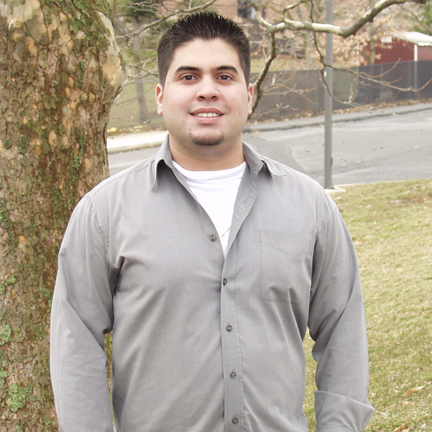 Penn State’s Advanced Vehicle Team won six awards at the EcoCAR 2 Year One Final Competition May 18 to 23, 2012, in Los Angeles.
Penn State’s Advanced Vehicle Team won six awards at the EcoCAR 2 Year One Final Competition May 18 to 23, 2012, in Los Angeles.
Eduardo Barrientos, a graduate student working at the EMS Energy Institute, served as the graduate research assistant and team leader to the EcoCAR 2 Team.
The goal of the three-year contest is to reduce the environmental impact of a General Motors-donated Chevrolet Malibu by improving its fuel efficiency and reducing its emissions while retaining its performance and consumer appeal.
Faculty Receive Promotions
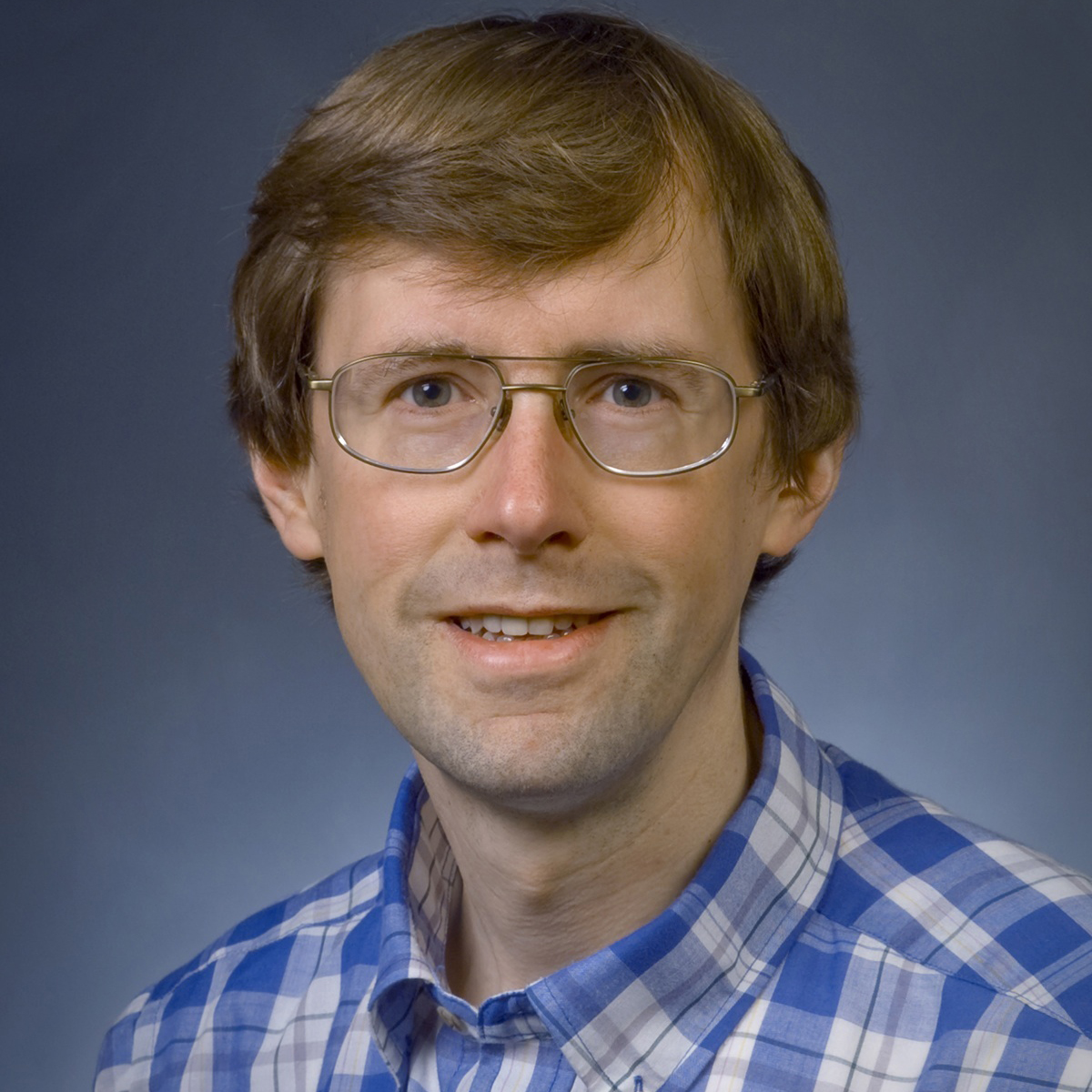 Randy Vander Wal received a promotion to professor and tenure. Vander Wal is co-director of the nanomaterials program at the Institute and his research focuses on applications for nanomaterials. Specific experience includes synthesizing a range of nanomaterials including carbon nanotubes, onions, capsules, metal oxide semiconductors, noble and transition metal catalysts, and nitrides. Synthesis methods have included CVD, plasma, and ablative methods with emphasis upon reacting flows for scalable production, for example, carbon nanotubes production.
Randy Vander Wal received a promotion to professor and tenure. Vander Wal is co-director of the nanomaterials program at the Institute and his research focuses on applications for nanomaterials. Specific experience includes synthesizing a range of nanomaterials including carbon nanotubes, onions, capsules, metal oxide semiconductors, noble and transition metal catalysts, and nitrides. Synthesis methods have included CVD, plasma, and ablative methods with emphasis upon reacting flows for scalable production, for example, carbon nanotubes production.
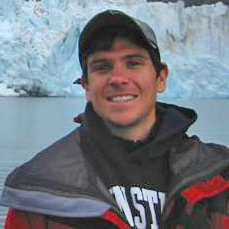 Demian M. Saffer received a promotion to professor. Saffer’s research falls between geohydrology, active tectonics, fault mechanics, and structural geology. His research group focuses on quantifying the relationships between fluid flow, mechanics and deformation, solute transport, and heat transport in a range of geologic settings. The work address fundamental problems in the geosciences, such as understanding the role of fluids in earthquakes, faulting, and heat transport, and quantifying the nature and timing of fluid flow, which ultimately affects processes ranging from fault healing between earthquakes to the sustenance of biological communities at the seafloor.
Demian M. Saffer received a promotion to professor. Saffer’s research falls between geohydrology, active tectonics, fault mechanics, and structural geology. His research group focuses on quantifying the relationships between fluid flow, mechanics and deformation, solute transport, and heat transport in a range of geologic settings. The work address fundamental problems in the geosciences, such as understanding the role of fluids in earthquakes, faulting, and heat transport, and quantifying the nature and timing of fluid flow, which ultimately affects processes ranging from fault healing between earthquakes to the sustenance of biological communities at the seafloor.
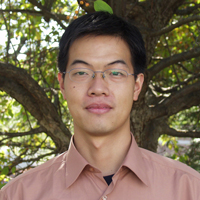 Xiaoxing Wang received a promotion to senior research associate at the EMS Energy Institute. Wang specializes in catalytic conversion of energy resources including petroleum, natural gas, and biomass, as well as the synthesis, characterization, and evaluation of materials such as microporous and mesoporous materials for energy related applications. His current research interests include catalysis and adsorption for fuel processing, desulfurization/purification of bio-gas, natural gas and other fuel gases, reforming of hydrocarbons and bio-fuels for hydrogen production, and carbon dioxide capture and utilization.
Xiaoxing Wang received a promotion to senior research associate at the EMS Energy Institute. Wang specializes in catalytic conversion of energy resources including petroleum, natural gas, and biomass, as well as the synthesis, characterization, and evaluation of materials such as microporous and mesoporous materials for energy related applications. His current research interests include catalysis and adsorption for fuel processing, desulfurization/purification of bio-gas, natural gas and other fuel gases, reforming of hydrocarbons and bio-fuels for hydrogen production, and carbon dioxide capture and utilization.
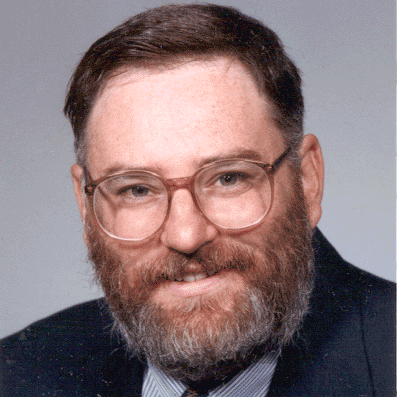 Jonathan Mathews received a promotion to associate professor and tenure. Mathews is co-director of the coal science and technology program at the Institute. His research focuses on many aspects of coal structure and its influence on coal behavior. This includes carbon dioxide sequestration in coal, molecular modeling of coal/char, coal to liquids research, and structural representation of complex behavior.
Jonathan Mathews received a promotion to associate professor and tenure. Mathews is co-director of the coal science and technology program at the Institute. His research focuses on many aspects of coal structure and its influence on coal behavior. This includes carbon dioxide sequestration in coal, molecular modeling of coal/char, coal to liquids research, and structural representation of complex behavior.
Chung-Hsuan Huang Wins Award for Work with NASA
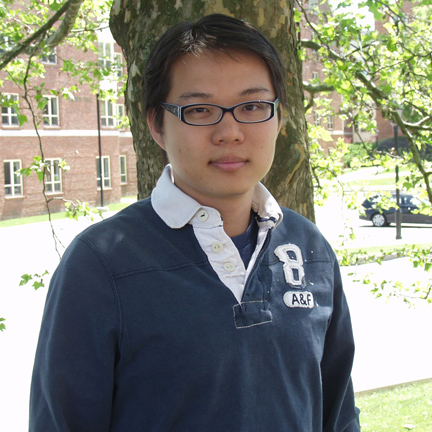 Randy Vander Wal, professor of energy and mineral engineering and materials science and engineering, and Chung-Hsuan Huang, a doctoral student in energy and mineral engineering, were part of the NASA Alternative Aviation Fuel Experiment Team who recently received their second NASA Group Achievement Award for “outstanding achievement in establishing the impact of hydro-treated renewable jet fuels on commercial aircraft engine performance and pollutant emissions.” Tasked with testing whether a biofuel made from chicken fat can be used as a viable jet fuel alternative, the team used a NASA DC-8 to conduct several studies with the biofuel, regular jet fuel, and a 50-50 blend of biofuel and jet fuel. The successful measurement of the biofuel’s effects on aircraft performance and gaseous and particulate emissions will assist both the U.S. military and the commercial airline industry in its assessment of alternative fuels for aviation use.
Randy Vander Wal, professor of energy and mineral engineering and materials science and engineering, and Chung-Hsuan Huang, a doctoral student in energy and mineral engineering, were part of the NASA Alternative Aviation Fuel Experiment Team who recently received their second NASA Group Achievement Award for “outstanding achievement in establishing the impact of hydro-treated renewable jet fuels on commercial aircraft engine performance and pollutant emissions.” Tasked with testing whether a biofuel made from chicken fat can be used as a viable jet fuel alternative, the team used a NASA DC-8 to conduct several studies with the biofuel, regular jet fuel, and a 50-50 blend of biofuel and jet fuel. The successful measurement of the biofuel’s effects on aircraft performance and gaseous and particulate emissions will assist both the U.S. military and the commercial airline industry in its assessment of alternative fuels for aviation use.
Peilin Cao Receives First Place in Poster Session
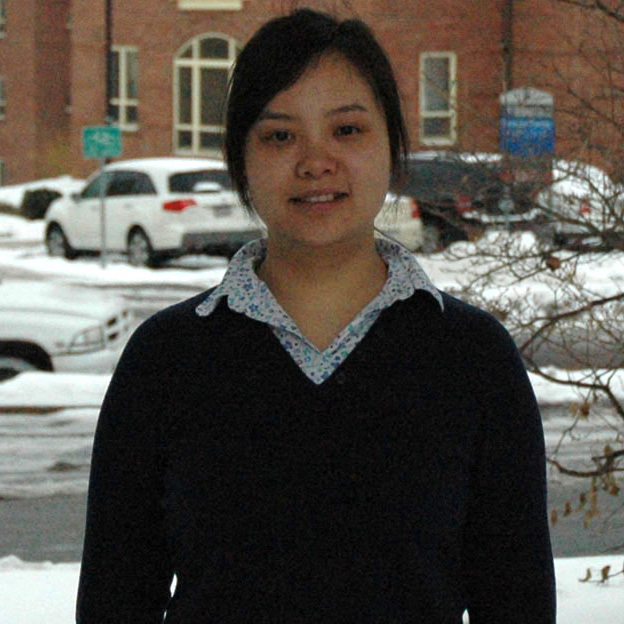 Peilin Cao, a doctoral candidate working at the EMS Energy Institute, received first place for her poster submitted in the Energy and Engineering category at the 2013 CarbonEARTH Carbon Conference. Cao is part of Professor Zuleima Karpyn’s flow in porus media research group. Cao’s research focuses on wellbore integrity and degradation of well cement under carbon dioxide sequestration conditions.
Peilin Cao, a doctoral candidate working at the EMS Energy Institute, received first place for her poster submitted in the Energy and Engineering category at the 2013 CarbonEARTH Carbon Conference. Cao is part of Professor Zuleima Karpyn’s flow in porus media research group. Cao’s research focuses on wellbore integrity and degradation of well cement under carbon dioxide sequestration conditions.
The Carbon Conference, which was held on February 23, brings together the University’s carbon research community and features talks by distinguished faculty on novel carbon research and an undergraduate/graduate/postdoctoral research poster competition.
Siddarth Sitamraju Receives Award to Attend Catalysis Conference
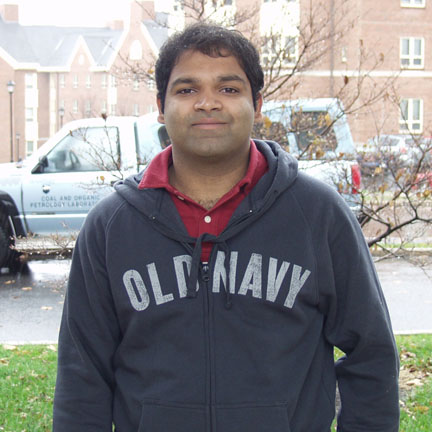 Siddarth Sitamraju, a graduate student working at the EMS Energy Institute, received the Kokes Awards, sponsored by the North American Catalysis Society and administered by the North American Meetings (NAM) organization. Sitamraju is a student in energy and mineral engineering with a fuel science option. He is part of Professor Chunshan Song’s clean fuels and catalysis research group.
Siddarth Sitamraju, a graduate student working at the EMS Energy Institute, received the Kokes Awards, sponsored by the North American Catalysis Society and administered by the North American Meetings (NAM) organization. Sitamraju is a student in energy and mineral engineering with a fuel science option. He is part of Professor Chunshan Song’s clean fuels and catalysis research group.
The objective of the Richard J. Kokes Travel Award program is to encourage the participation of students in the biennial North American Catalysis Society Meetings. Students who receive the award present a paper at the conference and contribute some time to the running of the conference. Traditionally, these awards have been presented to graduate students, but at the 22nd North American Meeting undergraduate students who met eligibility requirements were also considered.
Sijuola Odumabo Receives Award at Graduate Exhibition
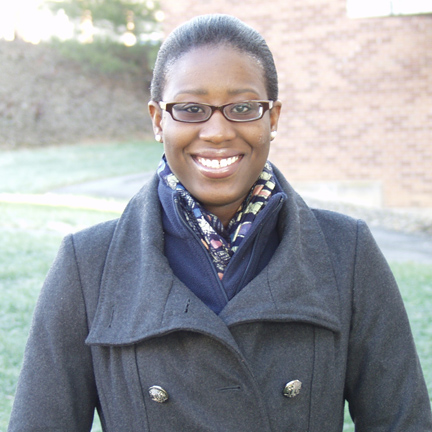 Sijuola Odumabo, a graduate student in petroleum and natural gas engineering received 3rd place at the 2013 Graduate Exhibition for her poster. The poster, “Gas Flow Hindrance Fracturing Fluid Invasion in Low Permeability Sandstones,” highlights work she is doing at the EMS Energy Institute. Odumabo’s advisor is Zuleima Karpyn, associate professor, petroleum and natural gas engineering.
Sijuola Odumabo, a graduate student in petroleum and natural gas engineering received 3rd place at the 2013 Graduate Exhibition for her poster. The poster, “Gas Flow Hindrance Fracturing Fluid Invasion in Low Permeability Sandstones,” highlights work she is doing at the EMS Energy Institute. Odumabo’s advisor is Zuleima Karpyn, associate professor, petroleum and natural gas engineering.
The Graduate Exhibition is open to all degree-seeking graduate students who are currently enrolled in graduate degree programs at Penn State and wish to present their scholarly work.
Chunshan Song’s Journal Publications are among “Hottest Articles”
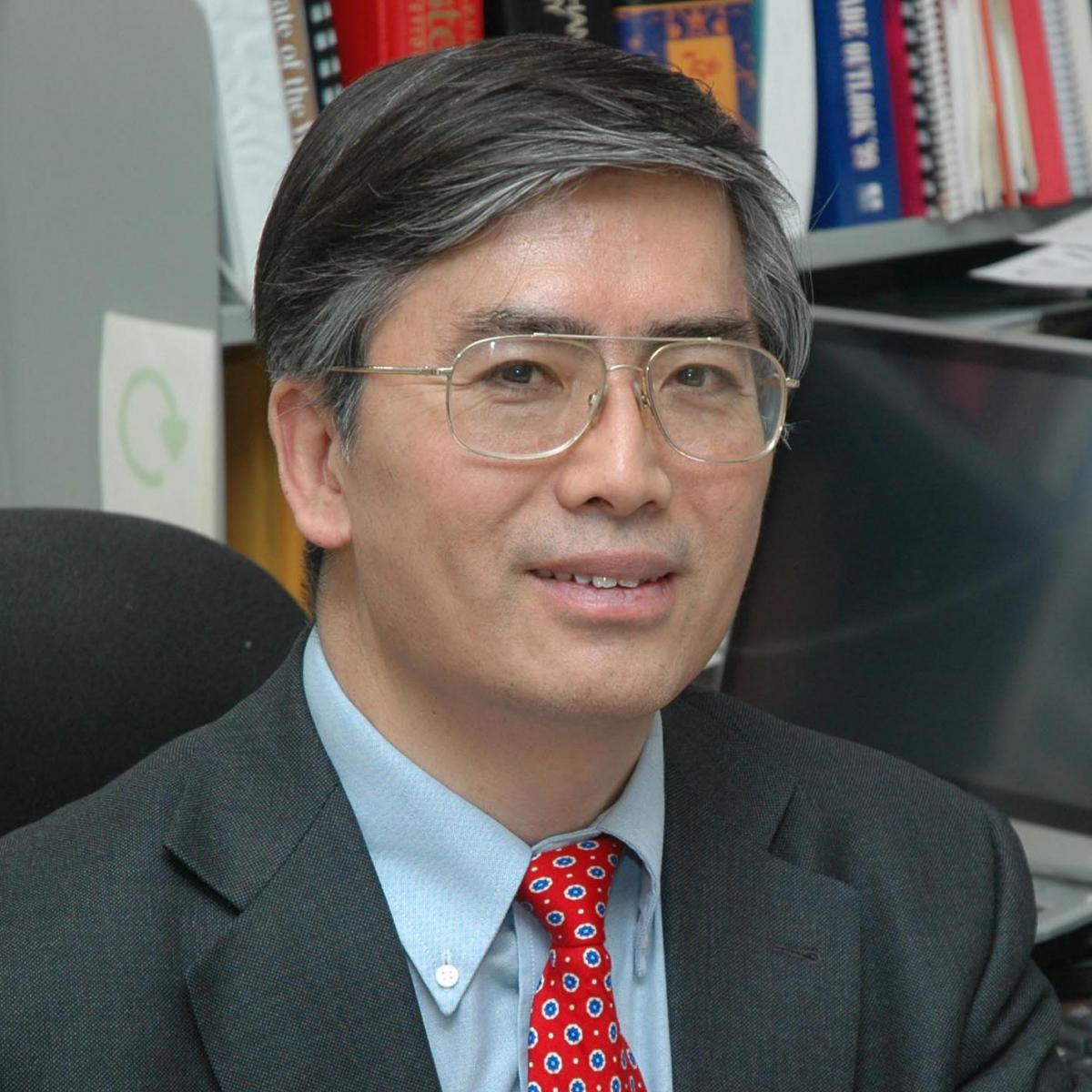 Chunshan Song, Distinguished Professor of Fuel Science has had two refereed journal publications listed in the top five most cited articles in Catalysis Today. The ranking is based on most cited articles among the over 5,500 published in the journal from 2002 to 2012.
Chunshan Song, Distinguished Professor of Fuel Science has had two refereed journal publications listed in the top five most cited articles in Catalysis Today. The ranking is based on most cited articles among the over 5,500 published in the journal from 2002 to 2012.
Both articles have been cited over 500 times and, according to the Science Citation Index on Web of Science, both articles have remained as the “Top 25 Hottest Articles” for more than 10 years. The publications are titled “An overview of new approaches to deep desulfurization for ultra-clean gasoline, diesel fuel and jet fuel” and “Fuel processing for low-temperature and high-temperature fuel cells — Challenges, and opportunities for sustainable development in the 21st century.” The articles were published in the journal Catalysis Today.

